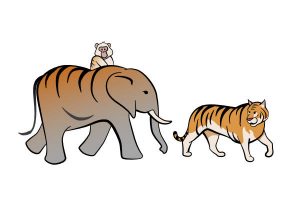 Leadership skills are skills inherent in the animal kingdom. Animals exhibit excellent governance aptitude. We kid you not. For instance, those that travel in groups are found to depend on interactions among its members when making migratory decisions. They do so by making distinct noises understood only by their own kind.
Leadership skills are skills inherent in the animal kingdom. Animals exhibit excellent governance aptitude. We kid you not. For instance, those that travel in groups are found to depend on interactions among its members when making migratory decisions. They do so by making distinct noises understood only by their own kind.
Male chimpanzees who rise through the “ranks” are observed to exhibit intelligence, intimidation, and political alliances. Elephants, on the other hand, rely on the oldest and largest female to make major decisions for the group. The existing matriarch can easily be overcome by another who is better able to care for the needs of the herd.
It isn’t different when it comes to the human species. Flourishing organizations the world over possess two characteristics in common – good leadership and team-based work culture.
Does leadership impact you?
If this piques your interest, you might want to check out Becoming TIGERS – Leading Your Team to Success and get yourself (several) copies. It’s a great read not only for the professional but for parents and little future leaders, as well. Anyone who wishes to enrich their skills as a leader benefits.
The book begins with the story of a young, tight-knit family tasked to read a book, The Tiger Lord’s Trials, for a weekend school assignment. The tale narrates the story of two tiger tribes each with a dedicated leader, Kali and Ashoka. But that’s where their similarity ends.
Kali’s tribe had fewer tribe members, less food, and a village in need of repair. The animals seemed to live in fear and everyone kept to themselves. Ashoka’s tribe, on the other hand, seemed to have more food, sturdier homes, and happier animals. Everyone in Ashoka’s tribe spent a lot of time together!
Where lies the difference in leadership?
The differences lay in culture and leadership set by Kali and Ashoka. It wasn’t until heavy rains that wiped away their village did this stark difference become evident. Despite the rising water, Kali wouldn’t let his tribe abandon the village. That was, until the mudslide forced everyone to flee.
But the story only begins from here. The process of rebuilding his village took on a more dramatic turn as Kali found that everything that had gone wrong … was because of him.
He didn’t trust his members. As a result, nobody spoke up for fear of being shut down. Because he found it beneath him to trust anyone else, he was reluctant to depend on members who possessed the necessary task skills he was not be an expert in.
Kali also thought himself untouchable. He didn’t make the effort to get to know his members on a more personal level. As such, he was seen as someone who lacked empathy (when in fact, he cared a whole lot for his tribe!). Forget about taking risks or being celebrated for successes. As a leader, he found it hard to acknowledge anyone for a job well done and everyone was severely punished and reprimanded for honest mistakes.
Does this leadership allegory sound familiar?
If this sounds eerily familiar, its because the same frequently happens in the workplace. The story is fictional, of course (and who doesn’t enjoy a good story). But the lack of trust, employee turnover because of a poor management style, a toxic workplace culture that doesn’t allow bilateral communication, underutilized skills and talent… all these (and more) are very pressing issues in many organizations. In fact, the workplace, could very well be the fictional jungle in the story with either a Kali-like boss or an Ashoka-like leader.
Discover how the issues were resolved HERE. It could very well be the key to turning things around by improving leadership in any organization with similar issues.
Copyright TIGERS Success Series, Inc. by Dianne Crampton
 About TIGERS Success Series, Inc.
About TIGERS Success Series, Inc.
Why guess what is needed for workforce development when it is completely unnecessary? Our mission is to improve the world of work for millions of employees while their organizations thrive. We accomplish this with a researched and validated comprehensive, robust system for improving both your work environment and profitability.
We specialize in developing high performance work cultures. Scaled to grow with you, our proprietary Team Behavior Profile, consulting and group facilitation services, and online TIGERS micro training packages are based on the six principles we have researched to be the right mix to make this happen. Invite us to present at your next conference or association meeting.